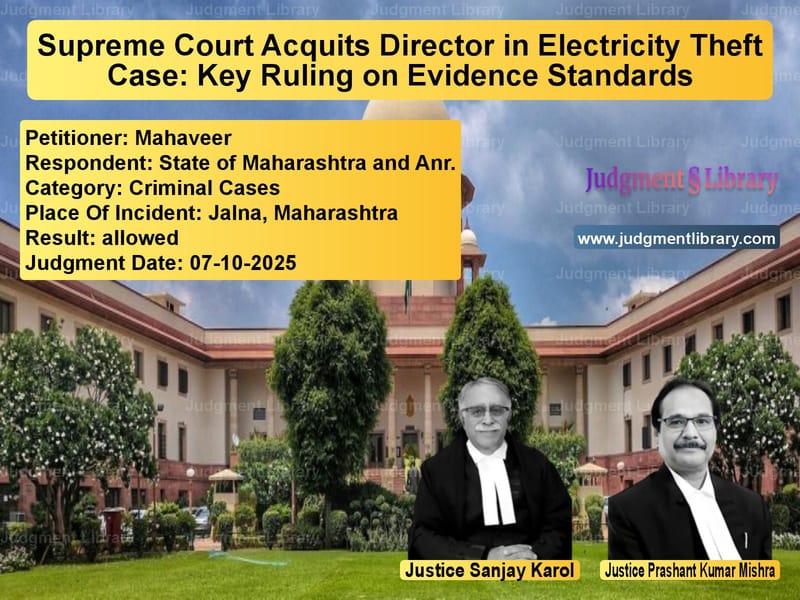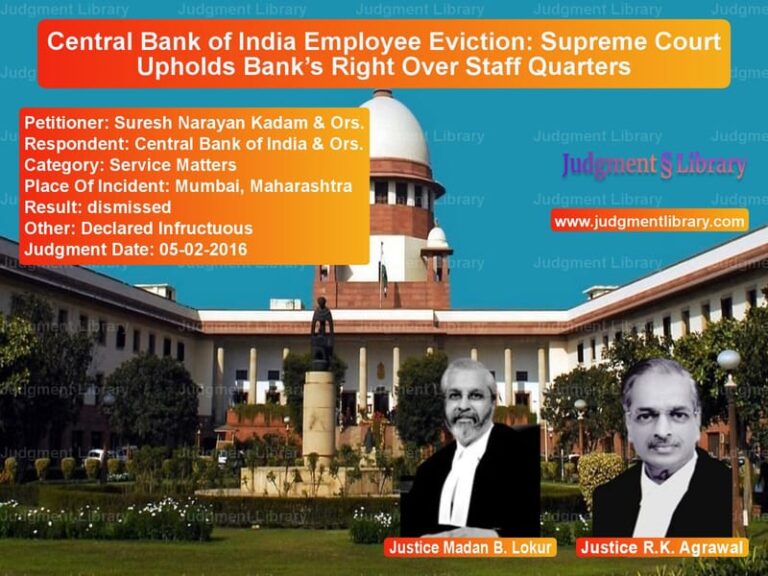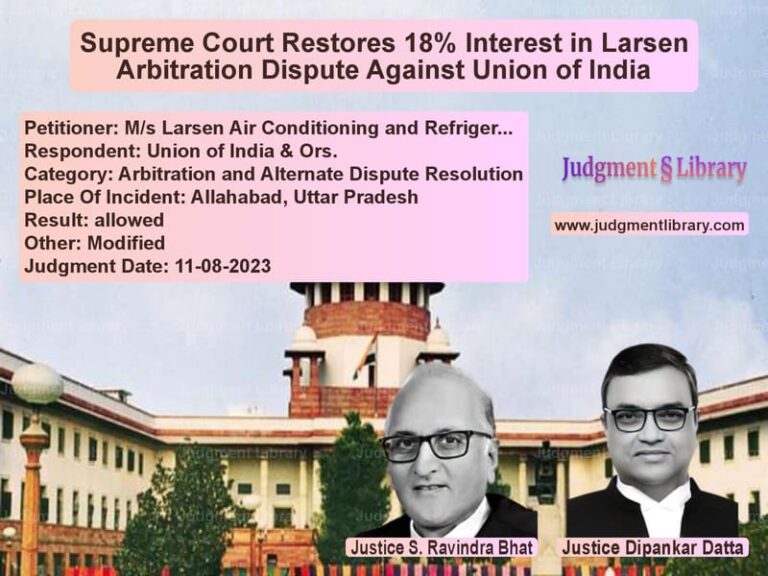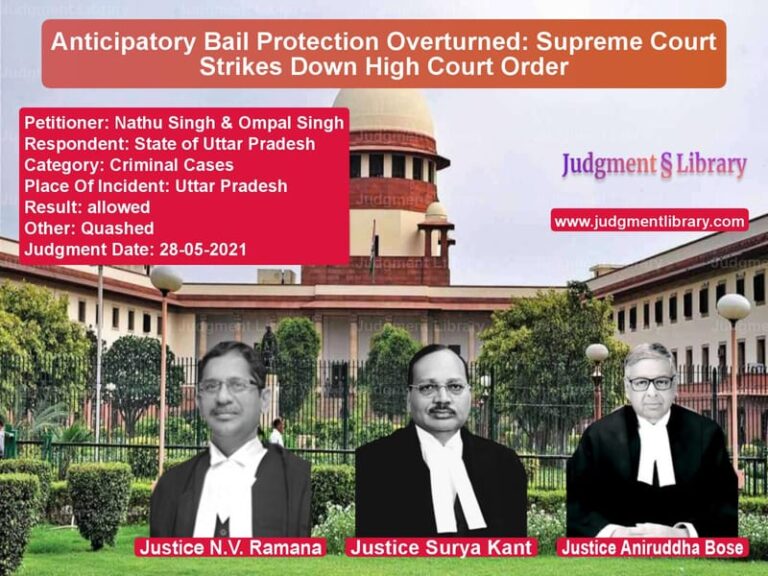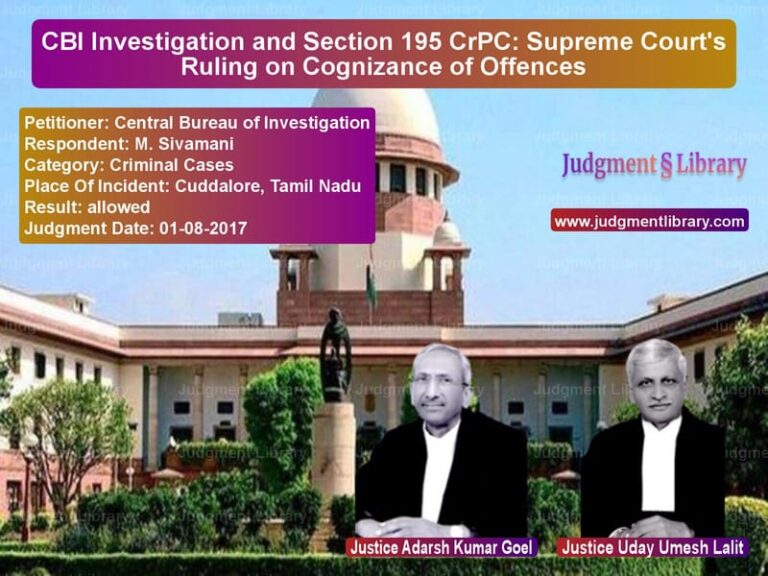Supreme Court Acquits Director in Electricity Theft Case: Key Ruling on Evidence Standards
In a significant ruling that underscores the importance of concrete evidence in criminal cases, the Supreme Court of India has acquitted a company director accused of electricity theft, setting aside the conviction imposed by the High Court. The judgment, delivered on October 8, 2025, highlights the fundamental principle that criminal convictions cannot be based on mere assumptions, possibilities, or estimations, but must be supported by evidence that proves guilt beyond reasonable doubt.
The case involved Mahaveer, a Director of M/s. Rushi Steels and Alloys Pvt. Ltd., who was accused of tampering with electricity meters to steal power worth approximately Rs. 30 lakhs. The legal journey of this case spanned over three decades, beginning in 1993 when officials from the Maharashtra State Electricity Board (MSEB) noticed a significant mismatch between the units supplied to the company’s factory and the readings from its meters.
The Case Background
The prosecution’s case began when MSEB officials, during an inspection in March 1993, discovered a 36.6% disparity in electricity consumption at the company’s factory in Jalna. During their investigation, they found three holes of 4mm each in the meter box. The officials alleged that these holes were being used to insert additional wires that interfered with the meter’s functioning, thereby slowing down its running and reducing the recorded consumption.
After sealing these holes, the officials observed that the disparity reduced to around 10%, which they claimed proved that theft had been occurring through these openings. Based on these findings, the Executive Engineer of MSEB lodged an FIR on June 25, 1993, leading to criminal charges under Sections 39 and 44 of the Indian Electricity Act, 1910.
The Trial Court’s Acquittal
The Trial Court, after examining five prosecution witnesses and recording statements under Section 313 of CrPC, acquitted Mahaveer and another accused on April 25, 1997. The Trial Court concluded that the prosecution had failed to establish its case beyond reasonable doubt and could not prove dishonest abstraction, consumption, or use of electrical energy.
The Trial Court’s order stated: “Both the accused viz., (1) Radheshyam S/o Ratanlal Agrawal, age 40 years and 2) Mahaveer S/o Ratanlal Agrawal, age 55 years, Directors of M/s. Rushi Steel and Alloys Pvt. Ltd. Company are hereby acquitted of the punishable offence under Section 39 of the Indian Electricity Act, 1910. Both the accused are further acquitted of punishable offence U/sec. 44 of the Indian Electricity Act, 1910.”
The High Court’s Reversal
The State appealed against the acquittal, and the High Court, in its judgment dated October 15, 2010, reversed the Trial Court’s decision. The High Court convicted Mahaveer and sentenced him to one year of rigorous imprisonment along with a fine of Rs. 2 lakhs.
The High Court reasoned that once the extra holes in the meter box were sealed, the consumption increased significantly, proving that the appellant was responsible for the theft. The Court also held that since the appellant had not attempted to prove that the extra holes were not caused by them, the presumption under the Electricity Act would operate against them.
Supreme Court’s Analysis
The Supreme Court, comprising Justices Sanjay Karol and Prashant Kumar Mishra, began its analysis by examining the legal provisions involved. Section 39 of the Indian Electricity Act deals with theft of energy, while Section 44 covers penalty for interference with meters or licensee’s works.
The Court noted the crucial legal principle governing Section 39: “A perusal of Section 39 of the Act reveals that any person who dishonestly abstracts, consumes or uses any energy commits theft of energy. The second part of the Section provides that if it is proved that any artificial means or the means that have not been authorised by the licensee, are used in such theft of energy till the contrary is proved, it shall be assumed and presumed that such theft has been committed by the consumer. What is obvious from the above is that for the presumption against the consumer to take effect, it must be proved that an artificial means or a means not authorised by the licensee had been used in committing the theft.”
This distinction proved crucial – the presumption under the Act only applies after the prosecution first proves that artificial means were used for theft. The burden then shifts to the accused to prove otherwise.
Examination of Witness Testimonies
The Supreme Court meticulously examined the testimonies of all five prosecution witnesses and found them lacking in concrete evidence.
PW-1, Shankarrao, who was a witness to the panchnama, stated during cross-examination that “when he signed the document, he had no knowledge of what had taken place there, nor was the document written as per his understanding. It was written independently, and he had only affixed his signature on it.” He admitted that he deduced theft without confirmation.
PW-2, Balwant, Deputy Executive Engineer of MSEB, admitted during cross-examination that “all the statement made by me by deposite and regarding less recording of energy are based on guesswork and nothing specific.” He further stated that he didn’t know whether the holes existed previously and that he had been “pressurised by superior in deposed before the Hon’ble Court.”
PW-3, the complainant, admitted that “all the conclusions reached by us in the alleged occurrence about theft of electricity in respect of metre box in question entirely based upon the inference only.”
PW-4 testified that his conclusion was based on suspicion and that he “adopted the procedure of elimination in between the 4 consumers after making observations of all for consumers and gave my conclusion that, the losses are due to 3 holes of metre box in question.”
PW-5, a retired Chief Engineer, admitted that “the existence of 3 holes at the bottom of the metre box of the accused is be only because for charging the accused for pilferage of energy.”
Court’s Critical Findings
The Supreme Court made several crucial observations about the quality of evidence presented. “It is evident from the above discussion and extracts of the testimonies put forward by the prosecution that none of them have deposed with complete confidence about the alleged theft of electricity and the use of artificial means therein, by the appellant-convict. Most of the testimonies are based on estimation, presumption, approximation or possibilities. Needless to state, the same cannot be deemed to be sufficient for the purposes of proving the above.”
The Court referenced its earlier decision in Vadivelu Thevar v. State of Madras, which categorizes witness testimonies, and found that the testimonies in this case fell into the ‘wholly unreliable’ category. Consequently, the presumption against the consumer under the Electricity Act could not be invoked.
Regarding the charge under Section 44, the Court observed: “Nothing has been brought on record to show that the meter had been injured or tampered with. None of the investigators from the MSEB carried out a practical exercise of checking the holes and the wires, and the possibility of it being actually used for theft, as is alleged to have taken place. None of the witnesses or any other third person saw the accused, or, for that matter, any other person connected to the Company, openly tampering with the box.”
The Court further noted the absence of crucial evidence: “There was no categorical statement whatsoever that at the time of installation or any time prior to the inspection of the meter box by officials of the MSEB, there were no holes in the box. In other words, there are too many open possibilities for criminal liability to be affixed to any person.”
Final Ruling and Acquittal
In its concluding remarks, the Supreme Court emphasized: “In our considered view, therefore, Section 44 of the Act also has not been proved beyond a reasonable doubt. Consequent to the above discussion, we hold that neither Sections 39 nor Section 44 could be established against the appellant-convict.”
The Court allowed the appeals, set aside the High Court’s judgment, and acquitted Mahaveer of all charges. The bail bonds were discharged, bringing an end to the 32-year legal battle.
This judgment serves as an important reminder of the fundamental principles of criminal jurisprudence – that the burden of proof lies with the prosecution, that convictions cannot be based on mere possibilities or assumptions, and that the benefit of doubt must always go to the accused. The Supreme Court’s meticulous examination of witness testimonies and its insistence on concrete evidence rather than inferences sets an important precedent for similar cases involving technical allegations of theft or tampering.
Petitioner Name: Mahaveer.Respondent Name: State of Maharashtra and Anr..Judgment By: Justice Sanjay Karol, Justice Prashant Kumar Mishra.Place Of Incident: Jalna, Maharashtra.Judgment Date: 07-10-2025.Result: allowed.
Don’t miss out on the full details! Download the complete judgment in PDF format below and gain valuable insights instantly!
Download Judgment: mahaveer-vs-state-of-maharashtra-supreme-court-of-india-judgment-dated-07-10-2025.pdf
Directly Download Judgment: Directly download this Judgment
See all petitions in Fraud and Forgery
See all petitions in Theft and Robbery Cases
See all petitions in Bail and Anticipatory Bail
See all petitions in Other Cases
See all petitions in Judgment by Sanjay Karol
See all petitions in Judgment by Prashant Kumar Mishra
See all petitions in allowed
See all petitions in supreme court of India judgments October 2025
See all petitions in 2025 judgments
See all posts in Criminal Cases Category
See all allowed petitions in Criminal Cases Category
See all Dismissed petitions in Criminal Cases Category
See all partially allowed petitions in Criminal Cases Category

